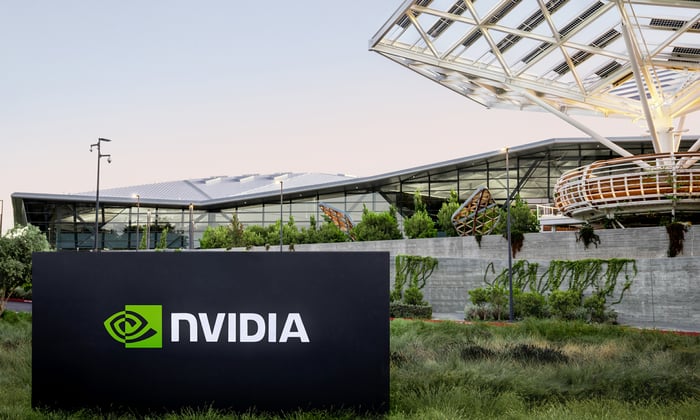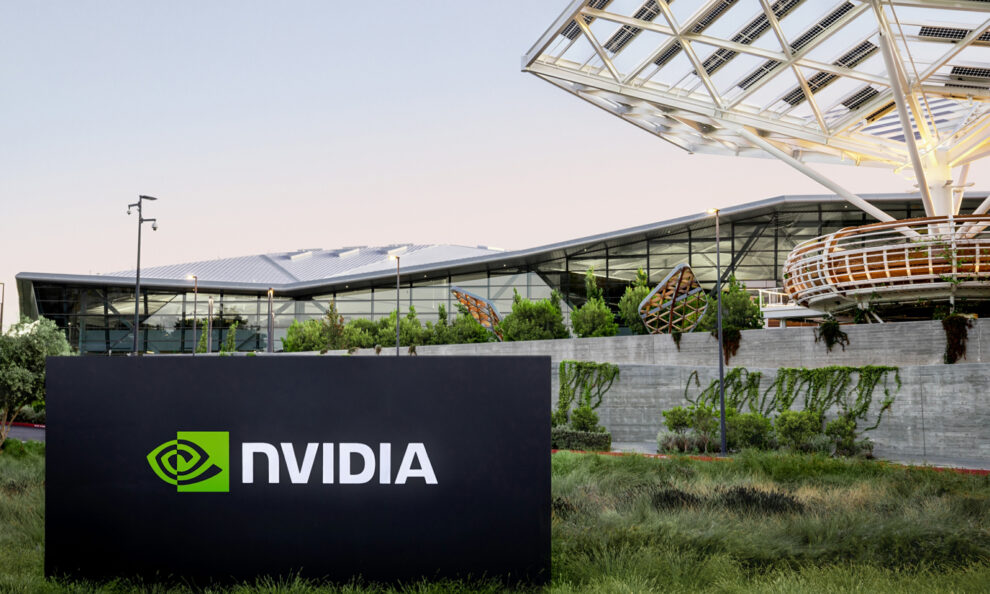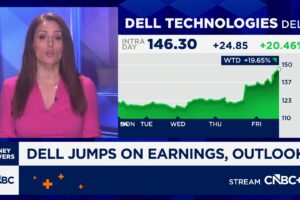Investors are about to get a fresh look at Nvidia’s artificial intelligence chip sales.
Nvidia (NVDA 1.46%) is at the epicenter of the artificial intelligence (AI) revolution. It designs the most powerful data center chips for AI development, and demand continues to outstrip supply which is driving a surge in the company’s revenue and earnings.
After the closing bell today — at around 5:00pm Eastern Time and 2:00pm Pacific — Nvidia will release its financial results for its fiscal 2025’s second quarter (ended July 31). The report will give investors a fresh look at the chip giant’s sales, and what it expects for the rest of this year.
Here’s what you need to know!

Image source: Nvidia.
Wall Street expects another blowout revenue number
Nvidia’s official guidance points to $28 billion in total revenue for Q2, representing 107% growth compared to the year-ago period. That might be conservative, though, because Wall Street’s consensus estimate has steadily climbed over the last couple of months and currently stands at $28.7 billion (according to LSEG).
Considering Nvidia delivered $26 billion in revenue during the first quarter (ended April 28), which was a whopping $2 billion more than the company had originally forecast, it’s no surprise that analysts think a beat is in the cards for Q2.
The data center segment accounted for $22.6 billion of Nvidia’s total Q1 revenue. All eyes will be on that number in the Q2 report because Nvidia’s graphics processors (GPUs) for the data center are critical to AI development. According to Wall Street, it could come in somewhere between $24.5 billion and $25.2 billion — any result above the high end of that range will likely spark a fresh wave of enthusiasm in Nvidia stock.
Tech giants like Microsoft, Alphabet, and Meta Platforms (to name a few) have each committed to spending tens of billions of dollars on AI data center infrastructure this year, and a significant amount of that money will flow directly to Nvidia through GPU sales.
That includes sales of the H100 GPU which set the benchmark for the industry last year, and the more recent H200 which can perform AI inference at twice the pace of its predecessor. But there’s also an entirely new generation of chips on the way.
Expect an update on Nvidia’s new Blackwell chips
Earlier this year, Nvidia announced a new GPU architecture called Blackwell. It’s designed to accommodate trillion-parameter large language models (LLMs) which, until now, have only been developed by leading AI companies like OpenAI.
Blackwell-based GPUs will be capable of substantially higher performance relative to their predecessors, and Nvidia says they will also be significantly more energy efficient. For example, the new DGX B200 system combines eight Blackwell B200 GPUs and can train AI models three times faster, performing AI inference 15 times faster, than the older DGX H100 system.
Nvidia CEO Jensen Huang says B200 GPUs will be priced at around $30,000 to $40,000, which is in the ballpark of what many customers paid for their H100 GPUs. In other words, given the substantial performance benefits, Blackwell will make it far more cost-efficient for businesses to access and deploy the most advanced AI models.
According to comments from Huang back in May, Nvidia should have started shipping Blackwell GPUs to customers in Q2, with sales ramping up as the year progresses. However, a recent report by The Information suggests a three-month delay could be due to a technical issue with the next-generation chips.
Nvidia hasn’t confirmed those rumored delays, but investors should listen closely for comments on Q2 Blackwell sales and any update to its guidance for the remainder of fiscal 2025. Huang previously said he expects to see “a lot” of Blackwell revenue this year, so any variation to the company’s timeline could substantially impact its future financial results.
Here’s how Nvidia stock might react
Nvidia stock has soared 765% since the start of 2023, when the AI boom really started ramping up. It’s now a $3.1 trillion company, so even a small move in its stock can be worth billions of dollars to its valuation.
While the performance of any stock on a given day is mostly noise, Nvidia reported its Q1 earnings after the bell on May 22, and its stock jumped 9.3% the following day. Remember, the company beat its revenue guidance by $2 billion on that occasion, so it’s possible that a similar result this time around could yield a comparable increase in its stock price.
With that said, Nvidia stock is currently trading 7% below its all-time high following a steep market correction earlier this month, and if the company delivers weaker results than expected, its stock could slip into a much deeper drawdown.
However, Nvidia stock appears cheap right now for investors with a multi-year time horizon. Wall Street expects the company to deliver $0.64 in earnings per share in Q2, which will take its trailing 12-month earnings to $2.17. That places the stock at a price-to-earnings (P/E) ratio of 58.3.
Although that’s almost twice as expensive as the Nasdaq-100 index, which trades at a P/E ratio of 32, the picture appears very different when looking further into the future. Analysts predict Nvidia will generate $3.81 in earnings per share in fiscal 2026, placing the stock at a more reasonable forward P/E ratio of 33.2.
In other words, as long as Nvidia’s Q2 report doesn’t produce a negative surprise, its stock looks like a good value at the current price for investors who can stay the course for at least the next couple of years.
Randi Zuckerberg, a former director of market development and spokeswoman for Facebook and sister to Meta Platforms CEO Mark Zuckerberg, is a member of The Motley Fool’s board of directors. Suzanne Frey, an executive at Alphabet, is a member of The Motley Fool’s board of directors. Anthony Di Pizio has no position in any of the stocks mentioned. The Motley Fool has positions in and recommends Alphabet, Meta Platforms, Microsoft, and Nvidia. The Motley Fool recommends the following options: long January 2026 $395 calls on Microsoft and short January 2026 $405 calls on Microsoft. The Motley Fool has a disclosure policy.












